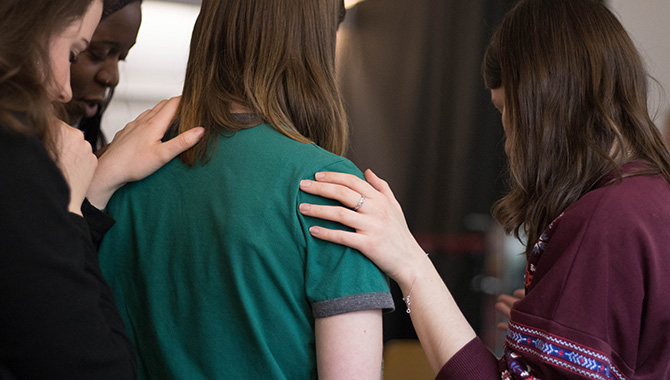Then Jesus said to Thomas, “Put your finger here and see my hands. Reach out your hand and put it in my side. Do not doubt but believe.” ~ John 20:27
Father Greg Boyle in his book The Whole Language shares a story about Anthony, a man in his mid-thirties, who has spent over half his life in and out of jails and detention centers. He and his twin brother were removed at the age of nine from a home filled with abuse and violence and sent to their grandmother. “She was the meanest person I’ve ever known,” Anthony says.
Their grandma made them sit “Indian style” in the hallway in their underpants. They could not move, and she put duct tape over their mouths because she “hated the sound of their voices.” “This is why,” Anthony says while holding back tears and placing a finger to his mouth, “I never shush my girls. I love the sound of their voices.”
Anthony’s oldest daughter will grab a crayon and draw freely on the wall. His wife yells, “Do something!” Anthony crouches down next to his daughter, puts his arm around her, and the two of them stare at the wall, his cheek resting on hers. He points at the crayon drawing and says, “Now, that’s the most magnificent work of art… I have ever seen.”
Anthony has come to embody the tenderness, the kindness, the love, and the patience of God. What is our understanding of God’s nature or presence? What do we embody with our words and actions?
“Meister Eckhart, the mystic and theologian who died in 1328, said, ‘It is a lie, any talk of God that does not comfort us,’” says Boyle. “If our God makes us feel unworthy and in debt, wrong God. If God frightens us, wrong God. If God is endlessly disappointed in us, wrong God. God is only interested in lavishing us with extravagant tenderness.”
So why do we so often insist on an angry, capricious God? Boyle writes, “Nothing is more consequential in our lives than the notion of God we hold. Not God. The notion of God. This is what steers the ship.”
What is our notion of God?
After his death, the Risen Christ appears to the disciples, but Thomas is absent. Thomas will not settle for a secondhand faith. Unless he sees Jesus and his wounds he will not believe. Growing up I remember hearing cautionary tales about Thomas. “Do not be a Doubting Thomas!” “Have faith!” Yet, as my faith has grown, so have my questions.
The Risen Christ meets Thomas where he is at. “Thomas, put your finger here and see my hands. Reach out your hand and put it in my side. Do not doubt but believe” (John 20:27). Christ welcomes Thomas’s questions with tenderness and patience. Christ creates a safe, sacred space for Thomas, his questions, and his doubt. The “Tender One” takes the duct tape off Thomas’s mouth and ours. Our Creator loves the sounds of our voices.
“Our God will not be outdone in extravagant tenderness,” writes Boyle. Let’s embrace and live in the tenderness of God.
Mirabai Starr says, “Once you know the God of Love, you fire all the other gods.” “It is always hard for us to believe in the nonjudgmental, loving, and merciful God, and yet, that is the God we actually have,” writes Boyle. How do we move from fear to love? From judgment to empathy? From condemnation to mercy?
I have written often about the harshness and the shock of my sister Becky’s death at age 42. When I heard the news, I knew “official” authorities would notify me personally of her death. I remember watching the police car wind its way up our road. I dreaded their impersonal notification of Becky’s death. How could they care?
When the police car pulled into our driveway, the passenger door opened and Sharon Day, a member of our church stepped out. She had tears in her eyes as she slowly walked up our stairs. Sharon opened the sliding glass door, walked over to me, and wrapped her arms around me. She held me and my pain as we cried with each other. For me, she was the tender embrace of Christ incarnate.
May we live in “tender kinship” with God and one another.
Blessings and peace,
Craig

